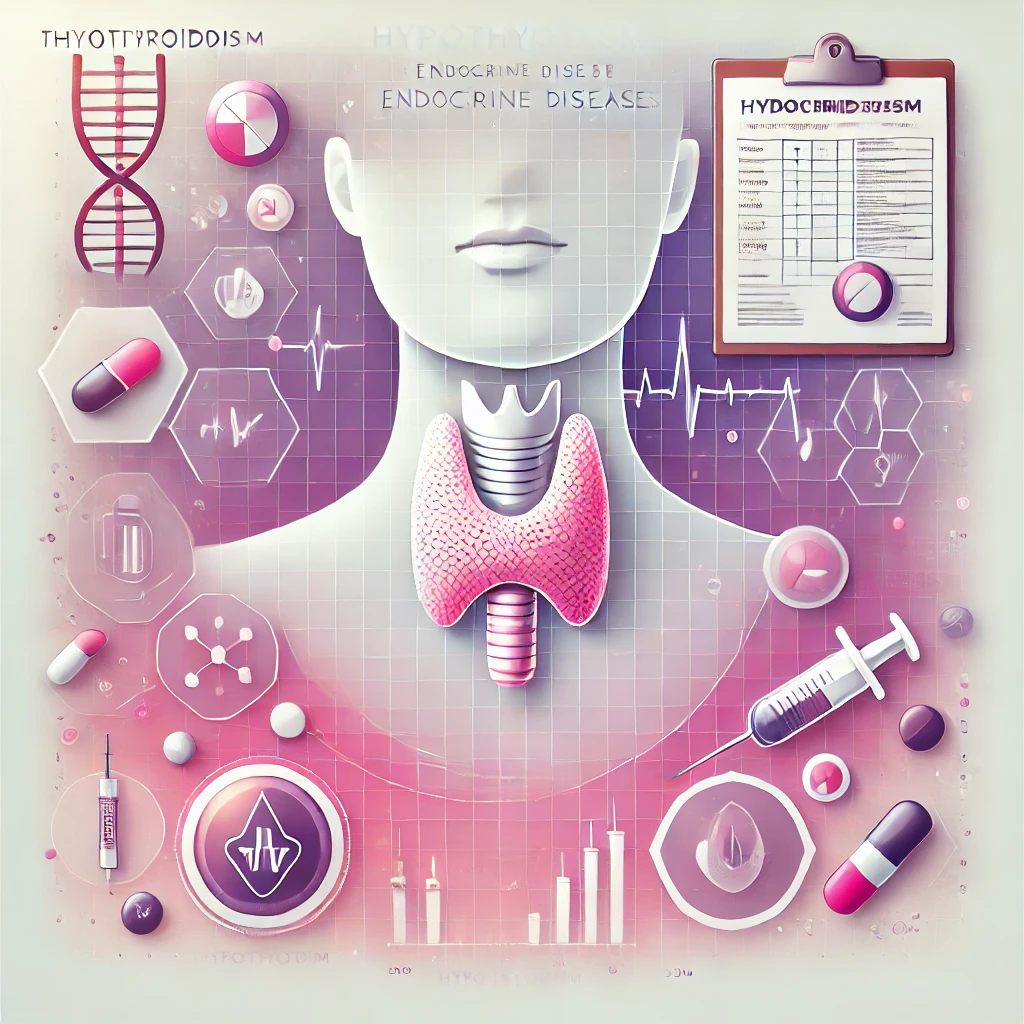Our Services
- Diabetes Mellitus
- Hypertension
- Osteoporosis
- Inflammatory Bowel Diseases
- Hypothyroidism and Endocrine Diseases
- Chronic Respiratory Diseases
- Chronic Neurological Diseases
- Chronic Liver Diseases
- Chronic Kidney Diseases
- Cardiovascular Diseases
- Arthritis and Rheumatic Diseases
- Confidential STD Testing & Treatment
- Women’s Health Screenings
- Men’s Health Screenings
- Obesity
- Vitamin Infusions
- Weight Management

Hypothyroidism and Endocrine Diseases
Endocrine diseases are disorders that affect the hormone-producing glands, leading to imbalances that impact metabolism, energy levels, and overall health. Common conditions include hypothyroidism, hyperthyroidism, and Cushing’s syndrome.
At our clinic, we provide continuous management to help balance hormones and improve overall well-being through personalized treatment plans, regular monitoring, and lifestyle modifications.
Types of Endocrine Diseases
1. Hypothyroidism (Underactive Thyroid)
- A condition where the thyroid gland does not produce enough thyroid hormones.
- Causes: Autoimmune disorders (e.g., Hashimoto’s thyroiditis), iodine deficiency, or thyroid surgery.
- Symptoms: Fatigue, weight gain, cold intolerance, dry skin, depression.
- Treatment: Daily thyroid hormone replacement therapy (levothyroxine).
2. Hyperthyroidism (Overactive Thyroid)
- A condition where the thyroid produces excessive thyroid hormones.
- Causes: Graves’ disease, thyroid nodules, excessive iodine intake.
- Symptoms: Unexplained weight loss, rapid heartbeat, nervousness, heat intolerance.
- Treatment: Antithyroid medications, radioactive iodine therapy, or surgery.
3. Cushing’s Syndrome
- A disorder caused by high levels of cortisol in the body.
- Causes: Long-term steroid use, tumors in the pituitary or adrenal glands.
- Symptoms: Weight gain (especially in the face and abdomen), muscle weakness, high blood pressure, fragile skin.
- Treatment: Medication, surgery, or lifestyle changes.
4. Other Common Endocrine Disorders
- Polycystic Ovary Syndrome (PCOS): Hormonal imbalance affecting ovulation.
- Diabetes Mellitus: Impaired insulin function affecting blood sugar levels.
- Adrenal Insufficiency (Addison’s Disease): Low cortisol production leading to fatigue and low blood pressure.
Symptoms of Endocrine Diseases
While symptoms vary by condition, general signs of hormonal imbalances include:
- Unexplained weight gain or loss.
- Fatigue & low energy levels.
- Changes in skin, hair, and nail health.
- Mood swings, depression, or anxiety.
- Irregular heart rate & blood pressure fluctuations.
- Menstrual irregularities & fertility issues.
Endocrine Disease Management & Treatment
1. Hormone Level Monitoring
- Blood tests to check thyroid, cortisol, and insulin levels.
- Imaging tests (ultrasound, MRI) for gland abnormalities.
- Regular follow-ups to adjust treatments based on hormone fluctuations.
2. Medication Therapy
- Thyroid hormone replacement (Levothyroxine) for hypothyroidism.
- Antithyroid drugs (Methimazole, PTU) for hyperthyroidism.
- Steroid or cortisol-lowering medications for Cushing’s syndrome.
3. Nutritional & Lifestyle Adjustments
- Balanced diet rich in iodine, selenium, and essential vitamins.
- Regular physical activity to support metabolism and weight management.
- Stress management techniques to reduce hormone-related complications.
4. Advanced Treatment Options
- Radioactive iodine therapy for severe hyperthyroidism.
- Surgical removal of tumors or thyroid gland (if needed).
- Hormonal replacement therapy for adrenal or pituitary disorders.
Complications of Untreated Endocrine Disorders
Without proper management, endocrine diseases can lead to:
- Heart disease & high blood pressure due to thyroid imbalances.
- Severe metabolic disorders affecting weight and energy levels.
- Osteoporosis & muscle weakness from prolonged hormone issues.
- Infertility & reproductive problems due to hormonal disruptions.
- Mental health challenges like depression and anxiety.
Advantage Endocrine Care
We provide a comprehensive endocrine health program, including:
✅ Accurate hormone level testing & continuous monitoring.
✅ Personalized treatment plans tailored to each patient’s needs.
✅ Medication & lifestyle guidance to improve overall well-being.
✅ Nutritional counseling & weight management support.
✅ Collaboration with endocrinologists for specialized care.


Health Tips & Info
- Follow your prescribed medication plan for hormone balance.
- Eat a nutrient-rich diet to support gland function.
- Stay physically active to maintain metabolic health.
- Manage stress levels to prevent hormone fluctuations.
- Get regular check-ups to detect hormonal imbalances early.